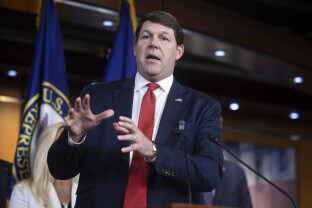House Republicans cleared the first hurdle of the reconciliation race on Thursday by advancing a budget resolution out of committee. Now comes the hard part.
After weeks of public sparring and private negotiations, the House Budget Committee voted 21-16 along party lines late Thursday night to advance the budget to the House floor.
But even if the Freedom Caucus is signaling its support for the reconciliation blueprint — which sets up $4.5 trillion in tax cuts, a minimum of $1.5 trillion in spending cuts and a $4 trillion increase in the debt ceiling — there’s no guarantee this process will end with success.
In fact, an amendment that Budget Chair Jodey Arrington was forced to push through may actually make final adoption of the budget and final passage of a reconciliation bill much tougher.
The deal Arrington struck with Freedom Caucus members was to include a provision mandating that, if Congress fails to cut $2 trillion in mandatory spending, Republicans would lose some of the $4.5 trillion they’ve allotted for tax cuts.
“If we don’t get to the $2 trillion spending reductions, we don’t stick at the 4.5,” Arrington told reporters, adding that the amount Republicans would lose in room for tax cuts would be “commensurate” with how much they fall short on the spending cuts.
The amendment also works the other way.
If the cuts exceed $2 trillion, the Ways and Means Committee would get more money for tax cuts. The potential increase could help Rep. Jason Smith, the Ways and Means Committee chair, who has said $4.5 trillion in tax cuts is not enough to accomplish President Donald Trump’s tax agenda.
But as much as the arrangement seems to give everyone something they want — conservatives get assurances about cuts, and tax-cut-loving Republicans get more budget latitude for their tax cuts — the arrangement will reinforce Democratic attacks that Republicans are funding tax cuts for the rich with Medicaid cuts affecting the poor and sick.
For now, however, Republicans only see upside.
“The seesaw occurs, so up and down on each side of the ledger, this makes everybody on Ways and Means a cheerleader,” Rep. Josh Brecheen, a House Freedom Caucus and budget committee member, told NOTUS.
The deal was struck during a late-night meeting on Wednesday between some of the budget committee’s holdouts and Arrington. While the original resolution included similar language, members said the new amendment is a stronger directive.
House GOP leaders are also suddenly feeling better about the budget’s floor prospects, after the Freedom Caucus enthusiastically got onboard.
“This is it. We declare victory,” House Freedom Caucus Chair Andy Harris said Thursday. “We have a bill that we believe had to be done rapidly to get the president border funding as soon as possible. We believe it had that meaningful deficit reduction, and we believe it had to be able to advance the president’s tax policy.”
“It all happens here,” Harris added. “We don’t need another bill.”
Even those who decried the resolution as “pathetic” on Wednesday, such as Rep. Eric Burlison, had only positive things to say come Thursday.
Of course, this is just the start. While the Freedom Caucus might be optimistic about the budget and the larger reconciliation bill, there is concern about other factions in the conference, particularly the moderate Republicans who have made raising the cap on the state and local tax deduction a prerequisite for their votes.
GOP leaders are well aware of the SALT issues and know that will be a key obstacle in the final debate.
“We gotta get all of our vulnerable members to recognize this is good for everybody and shore up anybody,” one senior GOP member told NOTUS. “If we can get Ralph Norman and Chip Roy to vote for it, for anybody else to not vote for it is all for show.”
—
Reese Gorman is a reporter at NOTUS. Emily Kennard, a NOTUS reporter and an Allbritton Journalism Institute fellow, contributed to this report.
Sign in
Log into your free account with your email. Don’t have one?
Check your email for a one-time code.
We sent a 4-digit code to . Enter the pin to confirm your account.
New code will be available in 1:00
Let’s try this again.
We encountered an error with the passcode sent to . Please reenter your email.


